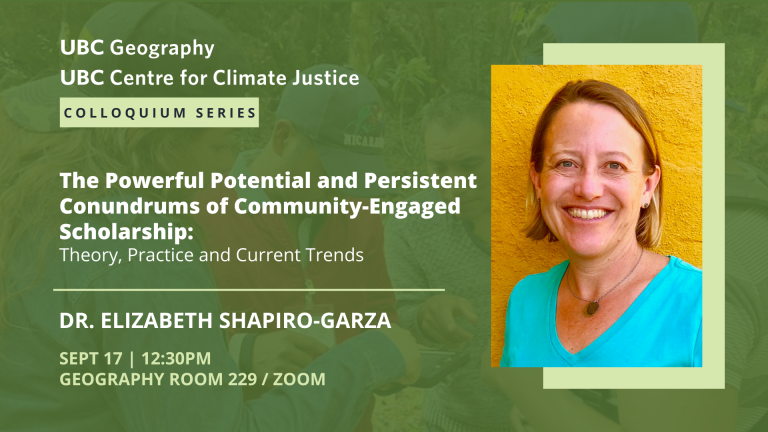
This talk is co-sponsored by UBC Geography and the Centre for Climate Justice.
Speaker:
Dr. Elizabeth Shapiro-Garza
Visiting from the Nicholas School of the Environment at Duke University, August 1, 2024 to October 31, 2024.
Abstract: Recent movements within academia have argued for greater engagement with and inclusion of relevant local communities in the process of research and of knowledge production more broadly. These calls are driven by both ethical concerns of the often-extractive nature of research involving communities who have been marginalized and a pragmatic awareness of the value of situated, local knowledge and world views for understanding systems studied. Deriving from a wide range of academic disciplines, these have included decolonial, pluriversal and inter-epistemic approaches to research practice based in critical theory and liberatory frameworks to the more instrumental focus of such methodologies as human-centered design and implementation science. However, to date there has been little dialogue among these various movements to promote community-engaged scholarship nor awareness of many similarly motivated previous sets of theories and methodologies. This talk will provide an overview of past and current calls for change to the institutions and practice of academic research on and with communities who have been marginalized. Drawing on both relevant literature and on specific examples of community-engaged scholarship in the environmental and natural resource fields, it will explore points of synergy and tension among these approaches, their potential power to enact social and environmental change, but also their persistent and pervasive challenges and limitations.
 Bio:
Bio:
Elizabeth Shapiro-Garza is an Associate Professor of the Practice of Environmental Policy and Management at the Nicholas School of the Environment at Duke University where she also serves as the Faculty Director for Engaged Scholarship for Duke University, the Director of Community Engagement for the Duke University Superfund Research Center and the Co-Director of the master’s program in Community Engagement and Environmental Justice. She is a human geographer with thirty years of experience in engaged scholarship in Latin American and the southeastern United States related to community management of and relationship with forests and agroforests.
This is hybrid event hosted in GEOG room 229 and on Zoom.